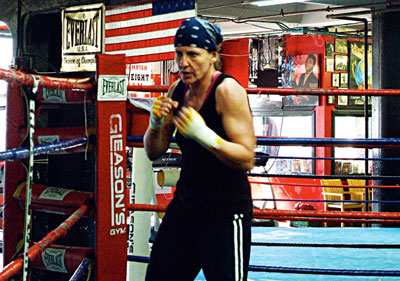Wedded to the ring
2011
 download a pdf of this essay
download a pdf of this essay

He edged close and whispered conspiratorially, "It's 'cause of the breasts, you know." My eyebrows shot up.
I had been raised in a post-feminist era to believe that my gender wouldn't stop me from doing anything in life. And I wasn't the only one. It seems that all over the world women and girls were defying these old-fashioned sexist edicts and lacing up the gloves, not to play but to fight. And now from virtually nothing, the sport of women's boxing will be included in the 2012 London Olympics, giving it the legitimacy it has long craved. The most recent Women's World Championships in Barbados in September, the first since the 2009 decision to make it an Olympic sport, attracted nearly 300?athletes from 60 countries, including a team of eight from Australia. So don't tell us we can't do something, because we'll just go right ahead and do it. Women's boxing has now become one of the world's fastest-growing sports.
I've had about 15 fights myself since that encounter with the old trainer, winning the Australian National Championship in 2001 as well as the US National Golden Gloves and Ringside World Championships as a masters boxer in 2009. I am over the 35-year age limit for the national team but I can compete in the US in a division created for the ageing pugilists who don't want to turn professional.
Since I started fighting in 1998, I have sustained a couple of broken noses and my fair share of black eyes and other bruises. But never once have my breasts objected.
In fact, they've been the least of my worries. On the top of the list was once my own courage and toughness, something I doubted for many years. The quest to identify it was the subject of my first book about the sport – Bruising. I thought I'd have a fight and write about the experience, thereby locking myself in.
But even after the book was published I found that I was still addicted to the sport. And so came more fights and a daily habit of training that I have been unable to shake.
My relationship with boxing has been like one you would have with another human being. I have loathed it and adored it. It has invaded my dreams and turned my stomach. I have resolved to reduce its significance in my life, only to see my passion for it intensify. Boxing is my man. Even my husband will tell you so.
Discovering the bigger world of women's boxing in New York in 2007 re-ignited my obsession after a few years of marking time when I stopped competing. I visited the world famous Gleason's Gym in Brooklyn and found that I had a different woman to spar with almost every day of the week, from world champions to beginners in all age categories.
Back home I was still shaping up against men and boys with only occasional sessions with other females, although that had begun slowly to change.
In New York I also discovered I could resume my fighting career in the new masters division. And so there was another book in the making, The Sweetest Thing, which traces my fighting journey in which I encounter some of the key women in the growth of the sport. These include my idol Lucia Rijker, who featured as the villain Billie "The Blue Bear" in the film Million Dollar Baby and was the subject of the documentary Shadow Boxers (see breakout). For years she had been regarded as the most dangerous woman on the planet, and it was a dream come true to train with her, be hit by her and discover that she was also a funny, smart and very warm and generous person.
 Wedded to the ring
Wedded to the ring